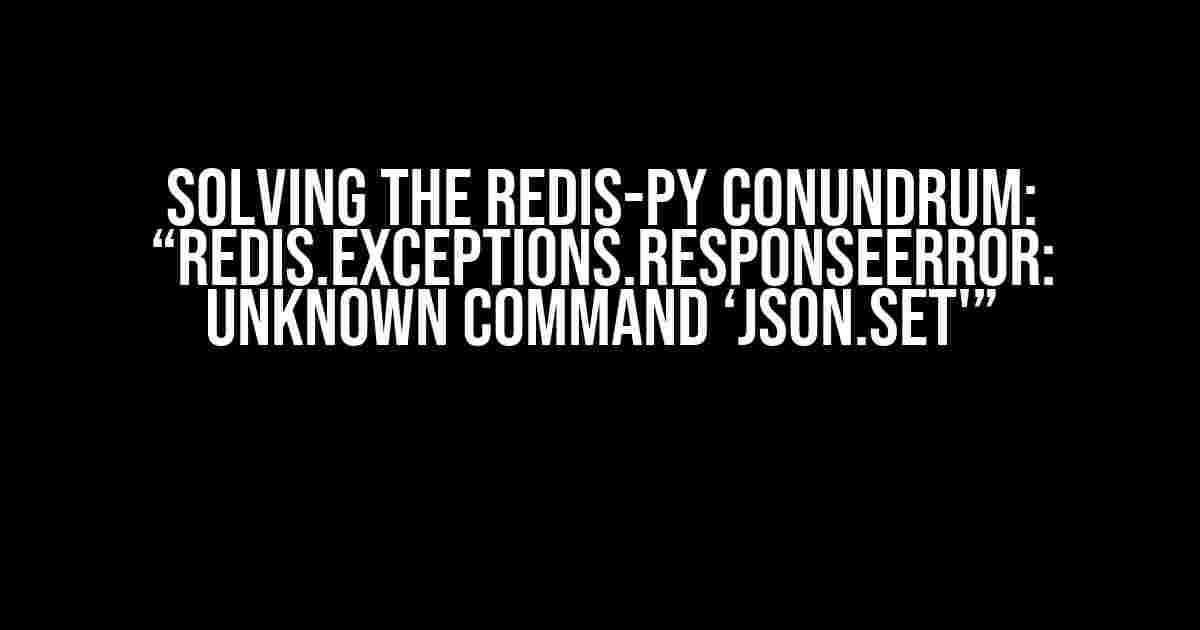Are you tired of stumbling upon the frustrating error “Redis.exceptions.ResponseError: unknown command ‘JSON.SET'” while working with Redis and Python? Fear not, dear developer, for we’ve got you covered! In this comprehensive guide, we’ll delve into the realm of Redis and Python, exploring the reasons behind this error and, more importantly, providing you with a step-by-step solution to overcome it.
What is Redis?
Before we dive into the error, let’s take a quick look at Redis. Redis is an in-memory, NoSQL data store that allows you to store and retrieve data in a variety of formats, including strings, hashes, lists, sets, and more. It’s an incredibly powerful tool for building fast, scalable, and efficient applications.
What is Redis-Py?
Redis-Py is the Python client for Redis. It provides a convenient way to interact with Redis from your Python applications, allowing you to perform various operations, such as setting and getting values, manipulating data structures, and executing commands.
The Error: “Redis.exceptions.ResponseError: unknown command ‘JSON.SET'”
Now, let’s focus on the error at hand. When you encounter “Redis.exceptions.ResponseError: unknown command ‘JSON.SET'”, it typically means that your Redis server does not support the JSON.SET command. But why is that?
Reason 1: Redis Version
The JSON.SET command is a relatively new addition to Redis, introduced in version 4.0.0. If you’re running an older version of Redis, you won’t have access to this command.
Reason 2: Redis Configuration
Another possible reason is that the Redis module “redisjson” is not enabled or configured properly. The redisjson module is required to support JSON-related commands, including JSON.SET.
Solution: Upgrading Redis and Enabling RedisJSON
Now that we’ve identified the potential causes, let’s move on to the solution! To fix the “Redis.exceptions.ResponseError: unknown command ‘JSON.SET'” error, follow these steps:
Step 1: Upgrade Redis to Version 4.0.0 or Higher
If you’re running an older version of Redis, upgrade to version 4.0.0 or higher. You can do this by running the following command:
sudo apt-get update && sudo apt-get install redis-serveror, if you’re using a different package manager, use the corresponding command.
Step 2: Enable RedisJSON Module
To enable the redisjson module, you’ll need to add the following line to your Redis configuration file (usually located at /etc/redis/redis.conf):
loadmodule /path/to/redisjson.soMake sure to replace “/path/to/redisjson.so” with the actual path to the redisjson module on your system.
After making these changes, restart your Redis server:
sudo service redis-server restartVerifying the Solution
Now that you’ve upgraded Redis and enabled the redisjson module, let’s verify that the solution works:
Using the Redis CLI
Open the Redis CLI and execute the following command:
redis-cli JSON.SET myjson '{ "foo": "bar" }'If everything is set up correctly, you should see the following response:
OKUsing Redis-Py
In your Python script, try executing the following code:
import redis
r = redis.Redis(host='localhost', port=6379, db=0)
r.json().set('myjson', '.') # Set the JSON value
print(r.json().get('myjson')) # Retrieve the JSON valueIf you’ve followed the steps correctly, you should see the JSON value printed in your console.
Conclusion
In this article, we’ve explored the “Redis.exceptions.ResponseError: unknown command ‘JSON.SET'” error and provided a step-by-step solution to overcome it. By upgrading Redis to version 4.0.0 or higher and enabling the redisjson module, you should be able to use the JSON.SET command without any issues.
Remember, when working with Redis and Python, it’s essential to ensure that your Redis server is properly configured and up-to-date. With the right setup and a solid understanding of Redis and Redis-Py, you’ll be well on your way to building fast, scalable, and efficient applications.
| Redis Version | JSON.SET Support |
|---|---|
| < 4.0.0 | No |
| ≥ 4.0.0 | Yes |
Don’t let the “Redis.exceptions.ResponseError: unknown command ‘JSON.SET'” error hold you back any longer! With this guide, you’re ready to tackle even the most complex Redis-related challenges.





